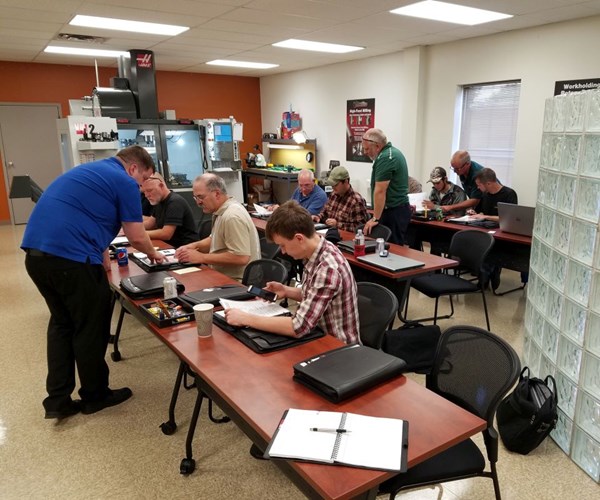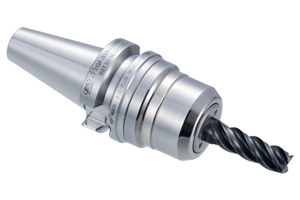Tool Mfr. Commits to Marketing-Free Product Training Seminars
Responding to feedback from its customers, Dapra Corp. changed its seminar model to focus less on marketing, and more on technical training.
Share






Attendees calculate speed and feed with the assistance of Dapra’s applications specialists during a training seminar at the company’s Midwest Technical Center in Rockford, Illinois. (Photo courtesy of Dapra Corp.)
For several years Dapra Corp. has had a technical center in Rockford, Illinois, where, like many other OEMs, the cutting tool manufacturer has conducted training sessions there for its end users and distributors. Recently, however, the company decided to make a change to its training model in response to customer comments about the difficulty of finding and training skilled labor.
Until recently, according to Product Manager Mike Bitner, the two-day seminars had been similar to other vendor-sponsored classes, with ample marketing material included in the training. In fact, it’s been a common complaint from Dapra’s customers that supplier training sessions put more time into product features and benefits than on practical machining training.
“Dapra decided to change that format and dedicate 100 percent of the time to technical milling training,” says Mr. Bitner, who adds that the training provided in these redesigned seminars can be applied to the use of any solid or indexable milling tool from any manufacturer. According to an article Mr. Bitner wrote recently, the topics covered in these seminars now include: choosing speeds and feeds from supplier literature; using speed and feed formulas; climb versus conventional milling; long-reach milling considerations; selection of toolholder style; air versus coolant tooling; coarse-pitch versus fine-pitch tooling; insert grades and geometries; soft versus hard milling techniques; chip thinning (axial and radial); chip formation and tool pressure based on cutting geometry; toolpath selections; and troubleshooting, including wear and failure characteristics.
“The program is really intended for anyone involved in the milling process from programming through setup,” says Mr. Bitner. “Very few of our competitors have field personnel capable of providing on-site training that teaches an end user how to get the most from new cutting tool technology. It is much more common that a manufacturer’s sales engineer is adept enough to conduct a test that earns him the sale, but is not savvy enough to spend the time educating the customer fully on the product. This results in much trial and error on the customer’s part finding out what they can and can’t do with the cutting tool, which can obviously get expensive and frustrating.”
In a program intended to benefit milling machine operators of varying skill levels, the intensive two-day seminar has been reduced to a maximum of 14 attendees at a time, allowing for one-on-one support. “We do not simply lecture for two days on milling techniques and formulas,” Mr. Bitner says. “We engage the class with practical demos on the machine tool, creating teams that are tasked with choosing a grade and geometry for an application, then calculating the proper speeds and feeds for each one as well. We discuss each team's findings as a group before we demonstrate the application, allowing everyone to participate and make safe mistakes.” He adds that the company has received positive feedback from this hands-on approach. Attendees say that the modules on tool selection and calculation of speeds and feeds have been the most beneficial.
Related Content
Nidec Universal Head Enables Versatile Machining
The compact universal head enables better accessibility between the tool and the workpiece, as well as improved surface-finish quality, greater motion range and high-efficiency machining under ideal machining conditions.
Read MoreBig Daishowa Chuck Eliminates Chatter in Milling Operations
The Mega 12DS chuck is designed for trochoidal milling with anti-vibration end mills.
Read MoreCeratizit Product Update Enhances Cutting Tool Solutions
The company has updated its MaxiMill 273-08 face mill, WPC – Change Drill, as well as the HyPower Rough and HyPower Access 4.5-degree hydraulic chucks.
Read MoreEmuge-Franken End Mill Wins ANCA's Tool of the Year Award
Emuge-Franken received the award for its specialized tool based on the new Cera-Cut end mill design.
Read MoreRead Next
Setting Up the Building Blocks for a Digital Factory
Woodward Inc. spent over a year developing an API to connect machines to its digital factory. Caron Engineering’s MiConnect has cut most of this process while also granting the shop greater access to machine information.
Read MoreBuilding Out a Foundation for Student Machinists
Autodesk and Haas have teamed up to produce an introductory course for students that covers the basics of CAD, CAM and CNC while providing them with a portfolio part.
Read More5 Rules of Thumb for Buying CNC Machine Tools
Use these tips to carefully plan your machine tool purchases and to avoid regretting your decision later.
Read More
















.jpg;maxWidth=300;quality=90)












